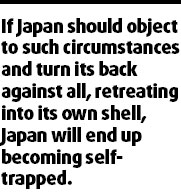Japan sees value of neighborly ties
Updated: 2007-11-28 07:10
Why do diplomatic relations with its neighboring countries such as South Korea and China loom as an important issue in Japan?
That is because diplomacy toward neighboring countries is ultimately the major watershed that will decide the direction where Japan's foreign policy is headed.
The problem pertaining to the conservative diplomacy that prevailed under the Shinzo Abe administration can be summarized as lack of a clear vision concerning Japan's diplomacy toward its neighboring countries.
Now the current leaders of Japan, China and South Korea are said to have agreed to continue developing the structure of trilateral talks independently of the ASEAN forum.
When we look back, Prime Minister Keizo Obuchi in 1999 stressed the significance of "neighborly relations" with South Korea and China.

At the time, Japan was reconfirming its security partnership with the United States, and was busy supporting countries suffering from the 1997 financial crisis that hit Asia.
Then in 1998, a dramatic historic reconciliation took place between Prime Minister Obuchi and South Korean President Kim Dae-jung.
Reverse trend
However, after entering the 21st century, Japan's relations with its Asian neighbors seemed to be driven in the opposite direction from the course taken in the 1990s.
There exist plenty of political and diplomatic issues such as territorial disputes and differences in philosophy and perceptions with China and South Korea that are difficult to solve.
The biggest paradox of the Abe diplomacy was how Shenzo Abe, as soon as taking office, promptly moved to improve relations with China and South Korea, despite his tenacious views on historical issues and his conservative beliefs.
His actions served a certain purpose in picking up the pieces in the wake of the Koizumi diplomacy. However, Abe's action soon had fizzled out which came as no surprise. In opinion polls, improvement of diplomatic relations with neighboring countries was often cited as one of the reasons why people approved the Abe administration.
This fact is a telling piece of evidence that shows how from the very beginning, there was an underlying basic disconnection between the impulses of the Abe diplomacy and the sensitivity of Japan's civil society.
In Abe, values such as free society and democracy were actually being upheld as slogans for a foreign policy based on conservative impulses. The resulting distortion is strangling Japan's sensibility toward diplomacy with neighboring countries.
There are deep underlying historical issues that further complicate matters. If Japan should make a misstep in handling the matter, there are grounds for the strain in Japan's relations with its Asian neighbors to have repercussions spreading to the US.
It is none other than the US that has the deepest emotional investment toward Japan's "postwar government" and the legitimacy of the "San Francisco Peace Treaty" framework that supported its foundation. And herein lies the basis for a coalition to spring up among South Korea, China and the US pertaining to historical issues.
If Japan should object to such circumstances and turn its back against all, retreating into its own shell, Japan will end up becoming self-trapped.
The conservative diplomacy of recent years is not driven by powerful revolutionary ambitions that challenge the existing international order. Rather, it feels as if the introspective impulses are being amplified by a nagging post-war trauma that laments the country's lack of "independence".
The author is professor of politics at Keio University Asahi Shimbun
(China Daily 11/28/2007 page11)
|
|
|
|
|
|